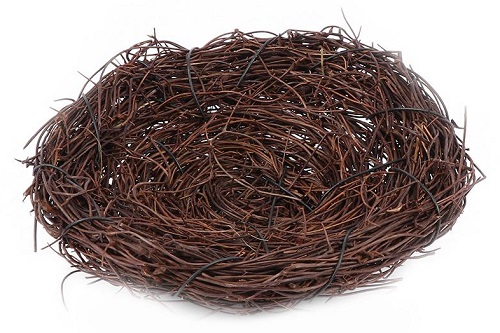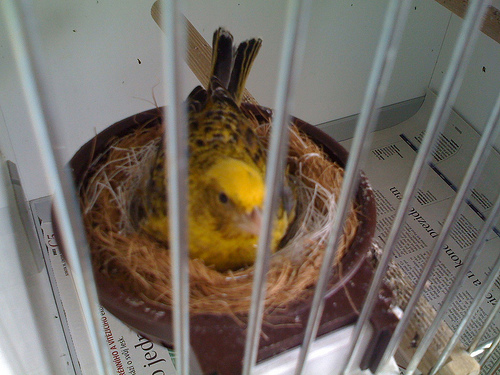FWP:
SETS == FILL-IN; GESTURES; TRANSLATABLES
BONDAGE: {1,5}
This isn't one of those verses in which the lover actually speaks as a bird (for examples see {126,5}), but he certainly depicts himself in an allegorical mode, with the 'likeness' of a bird. Not just any bird, of course, but a bird in a special situation: a captive bird who gathers, in his cage, straw for a nest.
The commentators are virtually unanimous that this verse is a picture of pathos and helplessness and vain longing for freedom. And certainly that's the first possibility that occurs to the reader; and there's {145,2} to convey exactly that sense of mourning and loss.
But consider the subtleties of {232,3}. In that verse, the bird claims very specifically to be at ease in a corner of the cage, to find it restful or even comfortable. We may read such a claim as ironic or self-deluding, but we can't dismiss the possibility that it might be meant straightforwardly. Who are we to say what a captive (Sufistic?) bird would or would not feel, ought or ought not to feel?
Similarly in the present verse, what does it mean that the caged bird is gathering straw for a nest? Here are some possibilities:
=The bird wistfully pretends that it will be able to raise
chicks in the cage.
=The bird naively believes that it will be able to raise chicks in the cage.
=The bird is settling down and making itself at home in the cage.
=The cage is well enough equipped that the bird finds what it needs to make
itself at home.
=The bird is only at the straw-gathering stage, and is not yet ready to make
a nest.
=The bird, a longtime captive, doesn't know how to make a nest, and can only
gather straw in vain.
=The bird, newly captured, is in fact going to lay eggs in the cage.
And then, when we try to apply these 'likenesses' or 'examples' to the life of the speaker, how are they to be interpreted? The cage could represent this world, or this society, or this state of poverty, or this captivity (as a chained-up madman), or the poetic demands of patrons, or the bonds of marriage and family. Held captive in one or more of these 'cages', the speaker nevertheless makes an 'effort'. His effort is like that of a caged bird gathering straw for a nest.
Is such an effort totally doomed from the beginning? Is it an effort that might yield some qualified, limited, bittersweet kind of success? Or is it an effort that might even, through heroic acts of accommodation and adjustment, yield something that the speaker would find-- or at least claim to find-- satisfactory? As usual, the tone of the verse, which alone can help the hearer to choose among these possible implications, is left for us to decide-- and to decide afresh every time we say the verse aloud. For we can all find similar emotional resonances in our own lives. I love this verse.
Compare {228,8}, another verse about nest-building.


Hali:
No greater extremity of effort can be described in any manner.
==Urdu text: Yadgar-e Ghalib, p. 166